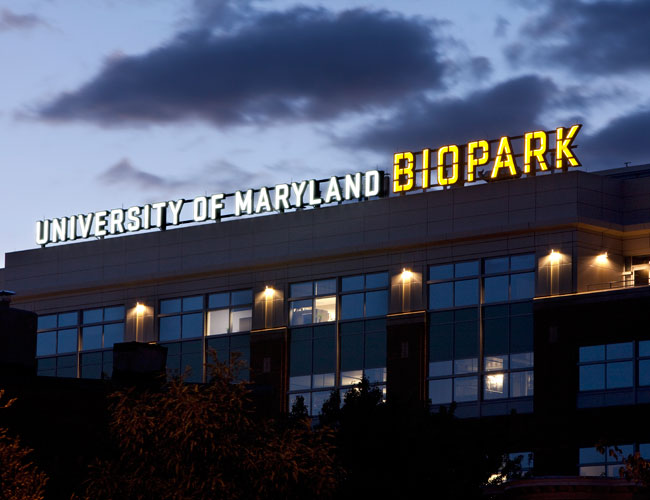The University of Maryland BioPark is looking to add another building that would feature a biotech incubator as its anchor.
Real estate firm Wexford Science + Technology is seeking public financing for a future building at 873 W. Baltimore St., which would be key in attracting a new branch of the Massachusetts-based Cambridge Innovation Center to Baltimore, officials say.
“The development of 873 W. Baltimore St. is critical to moving the BioPark and economic development in West Baltimore forward,” Baltimore Development Corporation President William H. Cole wrote in a memo to City Council President Bernard C. “Jack” Young. “Baltimore is in need of additional wet lab research space to attract new companies, as well as retain existing Baltimore biotech companies within the UMB BioPark.”
Current plans call for an eight-story, 250,000-square-foot building with office and lab space at the corner of West Baltimore and North Poppleton. Based on those plans, it would open in 2017. The building could house 700 permanent jobs.
We need more space or we're going to lose companies, or squeeze others out.
CIC would occupy 103,000 square feet of the building with an incubator and coworking space. Founded near MIT in Kendall Square in Cambridge, Mass., in 2001, CIC also has spaces across the Charles River from its original home in Boston, as well as in St. Louis, Mo. The real estate outfit is also planning to open incubators in Miami and Rotterdam.
BioPark officials are “very confident” CIC will move to Baltimore, said Jim Hughes, president of UM Ventures and UMB’s vice president of enterprise and economic development. Current BioPark space is fully leased, and Hughes said the BioPark is “desperately” in need of new space as more startups spin out of research.
“We need more space or we’re going to lose companies, or squeeze others out,” he said.
Bringing CIC to town would help attract more entrepreneurs to the university, who will engage with students and faculty, and hopefully want to stay connected after getting their startups off the ground, Hughes said.
“There’s a big focus on giving the companies access to resources at the university,” he said.
Incubators often also lead to more tech communities building up around them, as ETC did in Canton and Betamore did in Federal Hill. On the university level, Johns Hopkins has plans for a large, new incubator incubator as part of a new science and technology development in East Baltimore.
CIC reps did not respond to a request for comment.
To pay for part of the $110 million project, Wexford is seeking $17.5 million in Tax Increment Financing (TIF) that must be approved by City Council, where bills were filed last week. Under TIF, the city finances special obligation bonds to provide upfront development costs. As other publications like the Baltimore Brew have noted, TIF is usually used for roads and infrastructure around a new development. In this case, however, the money would be used directly for construction of the building.
For that money to be received, the state would also have to approve Baltimore’s first Regional Institution Strategic Enterprise (RISE) Zone. The special designation requires institutions and local governments to develop a “targeted strategy to use the institutional assets and financial incentives to attract businesses and create jobs within the zone.” The designation provides property tax credits for at least five years. Those moves are key to attracting CIC, Hughes has said. In recent testimony before the business-focused Augustine Commission, he called the RISE Zone program “a jewel in Maryland’s innovation economy.”
BioPark officials also backed proposed changes to the One Maryland Economic Development Tax Credit, so it would allow for incubators to benefit. But the measure did not pass the General Assembly last spring.
Before you go...
Please consider supporting Technical.ly to keep our independent journalism strong. Unlike most business-focused media outlets, we don’t have a paywall. Instead, we count on your personal and organizational support.
3 ways to support our work:- Contribute to the Journalism Fund. Charitable giving ensures our information remains free and accessible for residents to discover workforce programs and entrepreneurship pathways. This includes philanthropic grants and individual tax-deductible donations from readers like you.
- Use our Preferred Partners. Our directory of vetted providers offers high-quality recommendations for services our readers need, and each referral supports our journalism.
- Use our services. If you need entrepreneurs and tech leaders to buy your services, are seeking technologists to hire or want more professionals to know about your ecosystem, Technical.ly has the biggest and most engaged audience in the mid-Atlantic. We help companies tell their stories and answer big questions to meet and serve our community.
Join our growing Slack community
Join 5,000 tech professionals and entrepreneurs in our community Slack today!

The person charged in the UnitedHealthcare CEO shooting had a ton of tech connections

From rejection to innovation: How I built a tool to beat AI hiring algorithms at their own game

Where are the country’s most vibrant tech and startup communities?




